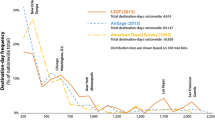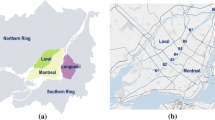Abstract
This study inferred the route-search system user travel profiles and purpose based on the relationship between the travel details in the route-search history data and the regional characteristics around bus stops along the routes of interest. Specifically, the search-history data of “Bus-Net,” a route-search system in Japan were used to define the travel demand. The route’s regional characteristics were expressed using the population and facility-location data. Subsequently, it was possible to construct a regression model with an adaptive Lasso penalty and demonstrate that residents and tourists use route-search systems for “non-routine” travel purposes, such as shopping and tourism.


Similar content being viewed by others
Explore related subjects
Discover the latest articles, news and stories from top researchers in related subjects.References
Kusakabe, T., Asakura, Y.: Bahavioural data mining of transit smart card data: a data fusion approach. Transp. Res. Part C: Emerg. Technol. 46, 179–191 (2014)
Alsger, A., Tavassoli, A., Mesbah, M., Ferreira, L., Hickman, M.: Public transport trip purpose inference using smart card fare data. Transp. Res. Part C: Emerg. Technol. 87, 123–137 (2018)
Meng, C., Cui, Y., He, Q., Su, L., Gao, J., “Travel Purpose Inference with GPS Trajectories, POIs and Geo-Tagged Social Media Data”, in Proceedings of 2017 IEEE International Conference on Big Data, 1319–1324 (Boston), (2017)
Ota, K., Nozu, N.: “Traffic and tourism behavior analysis based on route search request logs: things you can tell by the big data of traffic demand”, papers of research meeting on civil engineering. Planning. 52, 9 (2015) (in Japanese)
Kenjo, G., Ito, M., Kawamura, T., Sugahara, K., “User Behavior Analysis of the Web Service for Public Transit Assistant”, Papers and Proceedings of the Geographic Information Systems Association, 4 Pages (2012) (in Japanese)
Kagawa, T., Kuwano, M., Fukuyama, K., Tanimoto, K., Kawamura, T., Sugahara, K.: An analysis of movement desire characteristics using bus route search record. JSTE J. Traff. Eng. (Spec. Ed. A). 2(2), A_115-A_124 (2016) (in Japanese)
Tibshirani, R.: Regression shrinkage and selection via the lasso. J. R. Stat. Soc. Ser. B. 58, 267–288 (1996)
Zou, H.: The adaptive lasso and its oracle properties. J. Am. Stat. Assoc. 101, 1418–1429 (2006)
Hoerl, A.E., Kennard, R.W.: Ridge regression: biased estimation for nonorthogonal problems. Technometrics. 12(1), 55–67 (1970)
Basu, T., Einbeck, J., Troffaes, M.C.M., “A Sensitivity Analysis of the Adaptive Lasso”, 27 Pages, (2019), https://www.researchgate.net/profile/Tathagata_Basu/publication/335570398_A_sensitivity_analysis_of_the_adaptive_lasso/links/5d6e1d8d4585150886098446/A-sensitivity-analysis-of-the-adaptive-lasso.pdf
Chen, K., Chan, K.S.: Subset ARMA selection via the adaptive lasso. Stat. Interf. 4, 197–205 (2011)
Melkumova, L.E., Shatskikh, S.Y.: Comparing ridge and lasso estimators for data analysis. Proc. Eng. 201, 746–755 (2017)
Guenther, J., Sawodny, O.: Feature selection for thermal comfort modeling based on constrained lasso regression. IFAC-PapersOnLine. 52, 400–405 (2019)
Spencer, B., Alfandi, O., Al-Obeidat, F.: A refinement of lasso regression applied to temperature forecasting. Proc. Comput. Sci. 130, 728–735 (2018)
Min, X., Li, M., Dong, D., Feng, Z., Zhang, P., Ke, Z., You, H., Han, F., Ma, H., Tian, J., Wang, L.: Multi-parametric MRI-based radiomics signature for discriminating between clinically significant and insignificant prostate cancer: cross-validation of a machine learning method. Eur. J. Radiol. 115, 16–21 (2019)
Acknowledgments
This study was supported by JSPS Grants-in-Aid for Scientific Research (KAKENHI) Grant Number 20H02277. The authors thank Mr. Kentaro Nakai, the first year graduate student at the Tottori University, for the data aggregation.
Author information
Authors and Affiliations
Corresponding author
Ethics declarations
Conflict of Interest
The authors declare no conflicts of interest associated with this manuscript.
Additional information
Publisher’s Note
Springer Nature remains neutral with regard to jurisdictional claims in published maps and institutional affiliations.
Rights and permissions
About this article
Cite this article
Hosoe, M., Kuwano, M. & Moriyama, T. Trip Purpose Inference Based on the Relationship between Route Search Records and Regional Characteristics. Int. J. ITS Res. 20, 299–308 (2022). https://doi.org/10.1007/s13177-022-00295-4
Received:
Revised:
Accepted:
Published:
Issue Date:
DOI: https://doi.org/10.1007/s13177-022-00295-4




